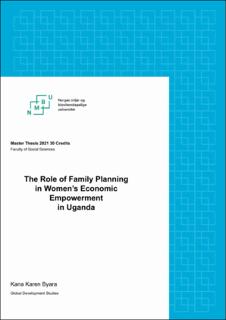| dc.description.abstract | The purpose of this study is to analyse the role of access to family planning information and services in women’s economic empowerment for women aged 18-35 in Uganda from ten different regions. The main research question answered in this thesis is: What role does access to family planning information and family planning services play in women’s economic empowerment in Uganda? To answer the research question, the study employed a mixed methods design, using both qualitative and quantitative methods to collect and analyse data. The study participants included Peer educators (n=7)who participated in interviews and an online survey and women who participated in the survey (n=1707) carried out by PMA through the Challenge Initiative. The qualitative data was analysed using thematic analysis, while the quantitative data was analysed using descriptive statistics through STATA. Nalia Kabeer’s framework) of empowerment was used as a lens to analyse the study findings.
Findings from the quantitative study reveal that women do not discuss their decisions about family planning with their husbands and partners and education levels of women do not play a role in women’s decision making about their family planning methods. Besides, the survey responses indicate that access to family planning information and services does play a role in women’s economic empowerment. Girls and women are eager to receive this information and services, however, there are still gaps in the Comprehensive Sexuality Education that could play a key role in meeting these needs. The Peer educators revealed that making family planning information and services available does impact economic empowerment by educating girls and women about their reproductive rights. The most popular family methods include male condoms, IUD and injectables. Peer educators reported that when more young women are knowledgeable and understand how to use family planning methods, they are more likely to make decisions that suit their well-being.
Overall, this study showed that access to family planning information and services plays a vital role in the process leading to economic empowerment. For instance, Peer educators have access to family planning information, are able to discuss and make decisions about the family planning methods they use and as a result understand their future goals and plans. The study has important implications to policy makers and other development agencies in terms of emphasising the power of family planning as a way to achieve women’s empowerment and subsequently, the realisation of Sustainable Development Goal 5, which aims at promoting gender equality and empowerment of women and girls. | en_US |

